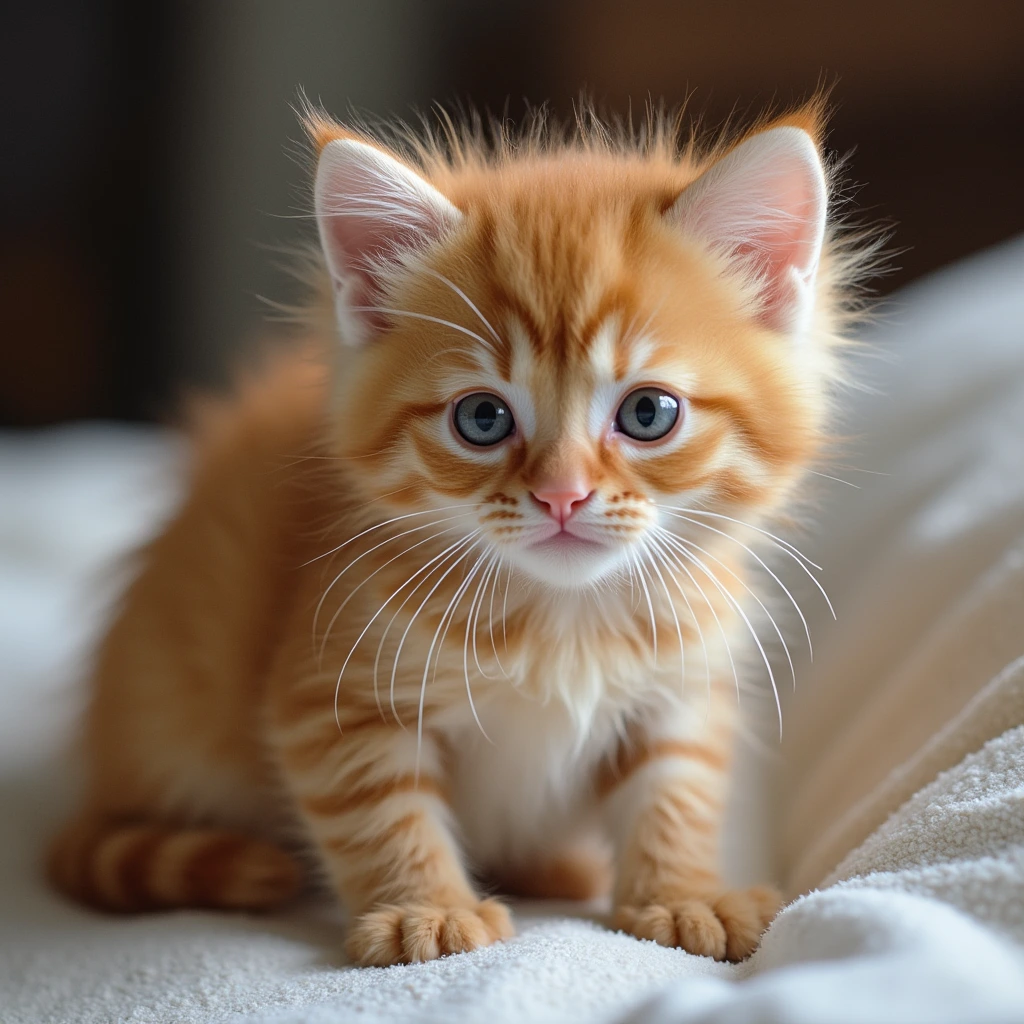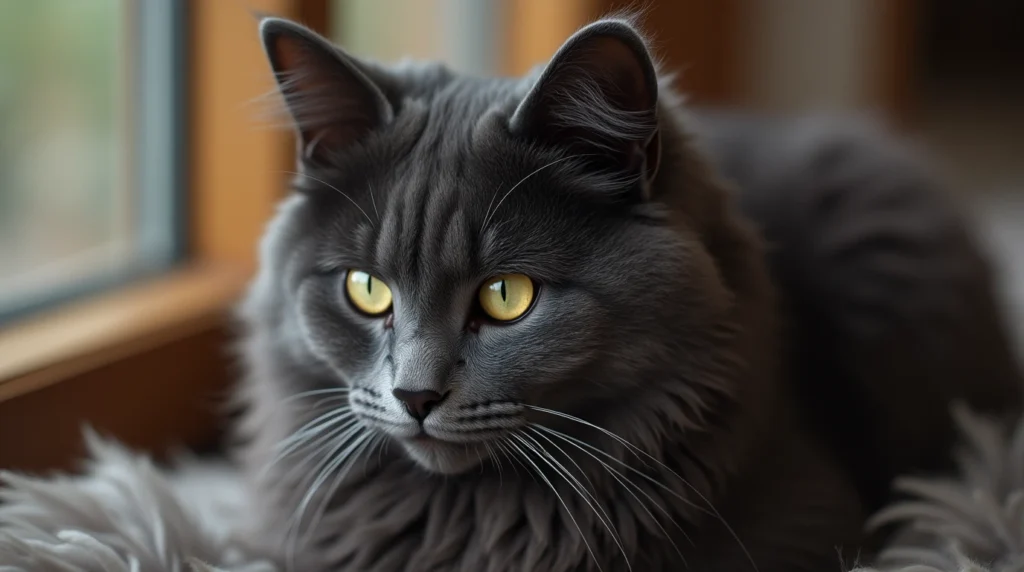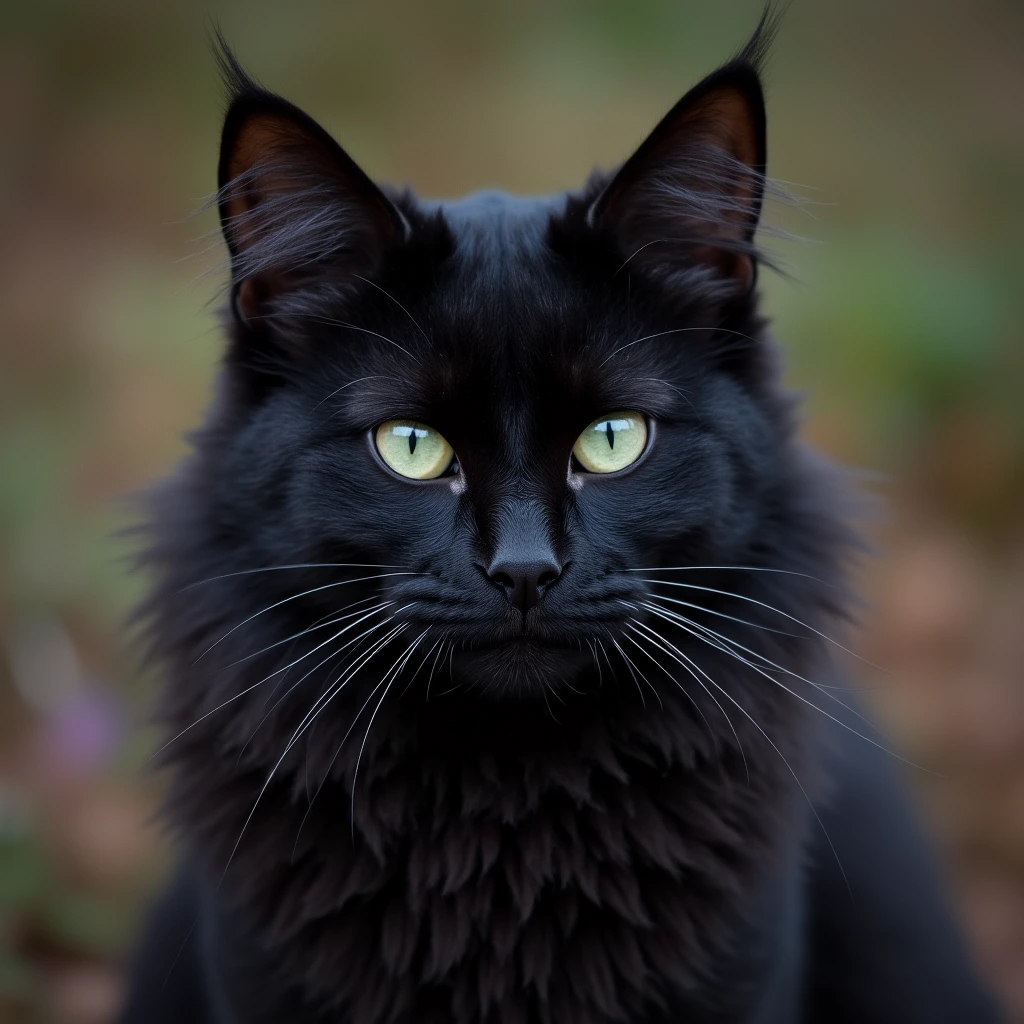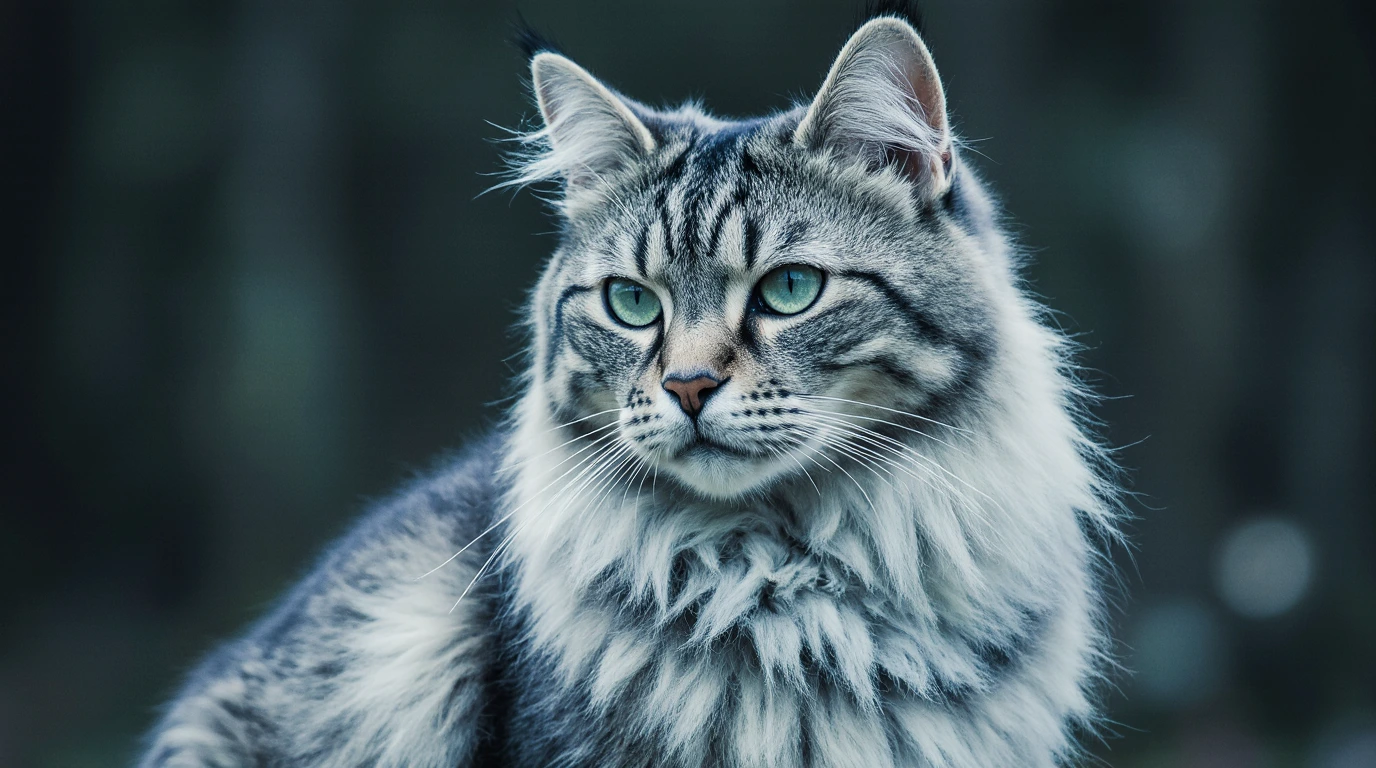Gato maine coon If you’ve ever spotted a cat so massive you did a double take, wondering if it was part lynx — chances are, it was a Maine Coon. This breed doesn’t just stand out for its impressive size and shaggy, lion-like mane; it’s also one of the most affectionate, curious, and downright charming companions you can bring into your home.
But before you fall in love with those tufted ears and that plume-like tail, it’s worth asking: how big do they really get? Are they as friendly as they look? What kind of care do they need? And are there any health issues to watch out for?
In this full guide, we’ll unpack everything you need to know about the Maine Coon cat — from its origins and personality to its grooming, nutrition, and health essentials. Whether you’re thinking about adopting one, already living with a gentle giant, or simply fascinated by this extraordinary breed, keep reading. There’s a lot more to the Maine Coon than meets the eye.
What is a Maine Coon? Origins and History
The Maine Coon cat is one of those rare breeds that feels more like a legend than a pet. Towering over most domestic cats with its muscular frame and thick, weatherproof coat, the Maine Coon has a backstory just as dramatic as its appearance — a mix of fact, folklore, and frontier resilience.
A Cat Born in the Wilds of Maine
As the name suggests, this breed hails from the northeastern U.S. state of Maine, where it was first recognized in the 19th century. Locals often referred to it as the “barn cat of Maine” — a rugged, adaptable feline built to withstand harsh winters and help control rodent populations on farms and ships.
Despite popular myths (including one involving cats and raccoons interbreeding, which is biologically impossible), the Maine Coon likely developed naturally through survival of the fittest — evolving thick fur, bushy tails, and large, snowshoe-like paws to thrive in icy conditions. Some speculate that it descends from longhaired cats brought over by seafarers — possibly Vikings — who interbred with local shorthaired cats.
Recognition and Rise to Fame
The Maine Coon is considered one of the first truly American cat breeds. In 1895, a Maine Coon named “Cosey” won Best in Show at the first major U.S. cat exhibition at Madison Square Garden. But the breed’s popularity took a dip in the early 20th century when more exotic-looking breeds arrived from Europe.
Luckily, passionate breeders in New England kept the Maine Coon’s legacy alive, and by the 1970s, it was officially recognized by major feline associations. Today, it’s not only Maine’s official state cat — it’s also one of the most popular and beloved breeds worldwide.
FAQ: Is the Maine Coon a natural or man-made breed?
Answer: The Maine Coon is considered a natural breed. Its traits developed organically over time in the cold climate of the northeastern U.S., likely through a combination of domestic and possibly seafaring longhaired cats adapting to their environment. Selective breeding came later, primarily to preserve and standardize its appearance.
Physical Characteristics of the Maine Coon – gato maine coon

It’s impossible to mistake a Maine Coon for an average house cat. Everything about them — from their sheer size to the wild, almost mythical aura they carry — feels larger-than-life. But their dramatic looks aren’t just for show. Each feature tells a story of survival and adaptation to the cold, rugged climate of New England.
Size and Build: The Gentle Giant of the Cat World
The Maine Coon holds the title of the largest domestic cat breed, with males typically weighing between 13–18 pounds (5.9–8.2 kg), and some even exceeding 20 pounds. Females are smaller but still substantial, often ranging from 8–12 pounds (3.6–5.4 kg). Their bodies are long, muscular, and rectangular, with broad chests and a presence that commands attention.
What’s especially fascinating is their slow growth rate. Unlike most cats, Maine Coons take 3 to 5 years to reach full physical maturity — and they just keep getting fluffier and more majestic with age.
Fur, Tail, and Adaptations for the Cold
The Maine Coon’s semi-longhaired coat is one of its defining features. It’s dense, water-resistant, and layered — shorter on the shoulders, longer on the belly and tail — offering both insulation and agility. Their tails are full and bushy, almost like a feather duster, which they use to wrap around themselves like a blanket when they sleep in cold environments.
And then there are the paws. Large, often tufted with fur, and sometimes even polydactyl (extra toes), Maine Coon paws act like natural snowshoes, helping them walk on snow without sinking.
Colors, Patterns, and Eye Variations
Maine Coons come in nearly every color and pattern imaginable — from classic tabby to solid black, cream, blue, and even calico. Their eyes are large, expressive, and usually green, gold, or copper, with some white-coated cats even displaying heterochromia (two different colored eyes).
While many think of the brown tabby as the “standard” Maine Coon look, the breed’s gene pool allows for an astonishing variety of coats and markings. No two Maine Coons look exactly alike — and that uniqueness is part of the allure.
FAQ: Are Maine Coons always fluffy and big?
Answer: Yes, but with nuance. All purebred Maine Coons will develop a thick, luxurious coat and a large, muscular build — but these traits take time. Some may appear less fluffy or smaller as kittens or young adults. Full maturity and coat development usually happen between ages 3 and 5.
Temperament and Behavior of the Maine Coon
If you’ve heard Maine Coons described as “gentle giants,” it’s not just clever branding — it’s a lived reality for most owners. Behind their lion-like exterior lies one of the most affectionate, quirky, and downright entertaining personalities in the cat world. They’re social without being clingy, playful without being chaotic, and loyal in a way that feels… dog-like.
Social, But Never Needy
Maine Coons tend to be deeply bonded with their humans, but they’re not your typical lap cats. They’ll follow you from room to room like a fluffy shadow, always watching, occasionally “chirping” to comment on your activities — but rarely demanding cuddles unless it’s on their terms. Think of them as your feline roommate: curious, present, and hilariously vocal.
They thrive in family settings and often do well with children, dogs, and other cats. Their temperament is remarkably tolerant, making them ideal for busy households.
Intelligence and Quirks
Don’t be surprised if your Maine Coon learns to open doors, play fetch, or “answer” when you call their name. These cats are highly intelligent and emotionally responsive. They enjoy puzzle toys, interactive play, and exploring vertical spaces. Some even have a fascination with water, dipping their paws into bowls or hopping into the shower out of sheer curiosity.
And then there’s the talking. Maine Coons are famous for their unique vocalizations: trills, chirps, and warbles that sound more like birds than cats. They don’t meow as much as they converse — and they always seem to have the last word.
Emotionally In Tune
While not overly needy, Maine Coons have a strong emotional radar. They pick up on moods, gravitate toward sick or stressed family members, and often stay nearby when you’re having a rough day. It’s subtle companionship — always present, never overwhelming.
FAQ: Are Maine Coons good pets for first-time cat owners?
Answer: Yes, absolutely — as long as you’re prepared for their size and grooming needs. Their friendly, adaptable nature makes them ideal for first-time cat owners who want an affectionate, intelligent companion. Just be ready for lots of fur, occasional vocal commentary, and a cat who acts more like a buddy than a pet.

Health and Lifespan of the Maine Coon
At first glance, the Maine Coon seems almost invincible — robust, thick-coated, built like a wildcat. But like any breed, they have their vulnerabilities. Understanding these early on can make a huge difference in the long-term well-being of your feline companion.
How Long Do Maine Coons Live?
On average, a healthy Maine Coon cat lives between 12 to 15 years, although many reach 16 or even 18 with proper care. There are even documented cases of Maine Coons living into their early 20s — a testament to their hardy genetics and the benefits of proactive healthcare.
But long life doesn’t happen by chance. Regular vet checkups, a balanced diet, and awareness of breed-specific conditions all play a role in keeping your Maine Coon thriving.
Common Health Issues to Watch For
While generally sturdy, Maine Coons are prone to a few hereditary conditions:
- Hypertrophic Cardiomyopathy (HCM): A common heart disease in cats, especially Maine Coons. It thickens the heart walls, potentially leading to failure. Responsible breeders often screen for this.
- Hip Dysplasia: Yes, cats can get this too. It’s more common in large breeds like the Maine Coon and may affect mobility over time.
- Spinal Muscular Atrophy (SMA): A genetic disorder that affects the spinal cord and muscles. Not painful, but can cause noticeable weakness in the hind legs.
- Polycystic Kidney Disease (PKD) and Pyruvate Kinase Deficiency (PKDef): Less common, but still worth testing for in breeding lines.
Genetic testing is crucial if you’re getting a Maine Coon from a breeder. If adopting, regular checkups can help catch early signs of disease before they become serious.
How to Keep Your Maine Coon Healthy
- Annual vet visits (twice a year after age 8)
- High-protein diet with portion control (they’re prone to obesity)
- Plenty of exercise and mental stimulation
- Dental hygiene — often overlooked, but critical
- Watch for subtle behavioral changes — Maine Coons tend to “hide” discomfort (gato maine coon)
FAQ: Can Maine Coons suffer in hot climates?
Answer: They can adapt to warm environments, but they need help. Their thick fur makes them prone to overheating, so keep them indoors during peak heat, provide cool surfaces, and brush regularly to remove excess undercoat. Hydration and airflow are key.
How to Care for a Maine Coon
Owning a Maine Coon is a bit like having a small, furry roommate who expects good meals, conversation, and the occasional spa day. While their personalities are easygoing, their care needs aren’t exactly low-maintenance. But with the right habits, caring for your Maine Coon becomes part of a deeply rewarding bond — not a chore.
Grooming: Managing All That Fluff
Despite their wild appearance, Maine Coons don’t mat as easily as other long-haired breeds — but that doesn’t mean you can ignore grooming. Aim to brush your cat 2–3 times per week (more during shedding season). This helps prevent knots, reduces hairballs, and keeps their coat in top shape.
Pro tip: Use a slicker brush and detangling comb combo, and start grooming routines young so it becomes a bonding ritual rather than a battle.
Diet: Fueling a Big, Active Body (gato maine coon).
These cats aren’t just large — they’re also active and muscular, which means they need high-quality food rich in animal protein. Portion control is key. It’s surprisingly easy for Maine Coons to put on extra weight, especially if they’re indoor-only.
Consider:
- Grain-free wet food mixed with dry kibble for dental health
- Scheduled feeding rather than free-feeding
- Occasional raw treats or freeze-dried protein snacks (with vet approval)
Exercise & Enrichment: Keep Their Minds (and Paws) Busy
Maine Coons are playful well into adulthood. They need stimulation — mentally and physically — to stay healthy and happy. Scratching posts, interactive toys, puzzle feeders, and cat trees are essentials, not extras.
Bonus: Many Maine Coons love water. You might catch them pawing at faucets or playing with their water bowls. Embrace it — try shallow water bowls or splash toys.
Routine Vet Care & Prevention
Because of their genetic predispositions, annual wellness exams (or bi-annual for seniors) are a must. Ask your vet about:
- Heart screenings (especially for HCM)
- Joint health supplements if signs of stiffness appear
- Dental cleanings — Maine Coons are prone to tartar buildup
Flea control, vaccinations, and parasite prevention should all be part of their care routine — especially if your cat has outdoor access.(gato maine coon)

FAQ: Do Maine Coons require special grooming compared to other cats?
Answer: Yes, but it’s more manageable than you’d expect. Their fur is dense but not overly prone to matting. With regular brushing, occasional nail trims, and some attention to ears and teeth, they stay in great shape. The key is consistency — and making grooming a positive experience.
Buying or Adopting a Maine Coon: What to Know (gato maine coon).
Falling for a Maine Coon is the easy part — deciding how (and where) to get one is where things get real. Whether you’re considering purchasing from a breeder or adopting from a shelter, there’s more at stake than just finding a cute kitten. Your choices now can shape your cat’s health, temperament, and overall well-being for years to come.(gato maine coon).
Buying from a Breeder: Red Flags and Must-Haves (gato maine coon).
If you’re buying, it’s absolutely vital to work with a reputable breeder. Maine Coons are a popular — and expensive — breed, which unfortunately makes them a target for unethical sellers.(gato maine coon).
A responsible breeder will:
- Provide health screening results (especially for HCM, SMA, and PKDef)
- Let you visit their facility or offer live video tours
- Show pedigree documentation and vet records
- Never sell kittens younger than 12 weeks
- Be transparent about temperament, diet, and quirks
Expect to pay between $1,000 and $2,500 depending on pedigree, location, and breeder reputation. If the price seems “too good to be true,” it probably is.(gato maine coon).
Adoption: An Overlooked but Rewarding Path (gato maine coon).
Maine Coons and Maine Coon mixes do show up in shelters and breed-specific rescues — especially adults or retirees from breeding programs. Adopting isn’t just more affordable; it’s deeply meaningful. You’re giving a home to a cat that already knows how to be a companion.
Benefits of adopting:
- Often lower cost ($50–$300)
- Many come already neutered, vaccinated, and microchipped
- Older cats are calmer, often fully trained, and grateful
If adopting, ask the shelter or rescue:
- Has the cat been behaviorally evaluated?
- Is it a confirmed Maine Coon or a mix?
- Are there known health issues?
Scams to Avoid
Sadly, Maine Coon scams are everywhere online — fake breeders, stolen kitten photos, or offers with no health records. Always:
- Avoid buying from social media ads or classified listings without research
- Never wire money without vetting the source
- Cross-check breeder reviews, websites, and credentials
Trust your gut — if something feels off, walk away.
FAQ: Is it better to adopt or buy a Maine Coon? (gato maine coon).
Answer: There’s no universal “better” — it depends on your priorities. Buying from a vetted breeder gives you predictability in genetics and temperament, especially with kittens. Adopting, however, is more ethical, cost-effective, and emotionally fulfilling for many. Either way, due diligence matters.(gato maine coon).
Frequently Asked Questions About Maine Coons (gato maine coon).
Even after reading everything about Maine Coons, a few lingering questions always seem to pop up. Here are the most common ones — with honest, straightforward answers based on real-world experience and veterinary insight.
Are Maine Coons good indoor cats? (gato maine coon).
Answer: Absolutely. While they enjoy space and exploration, Maine Coons adapt well to indoor life — especially if they have climbing structures, toys, and regular playtime. If you live in an apartment, vertical enrichment (like cat trees) is essential.
Do Maine Coons get along with other pets? (gato maine coon).
Answer: Generally, yes. Maine Coons are famously tolerant and sociable. They tend to do well with dogs, other cats, and even kids — as long as introductions are slow and respectful.
Do Maine Coons shed a lot? (gato maine coon).
Answer: They do shed, especially during seasonal changes. However, with regular brushing (2–3 times per week), you can manage the fur and reduce hairballs. Their coat is less prone to matting than it looks.
How can I tell if a cat is a real Maine Coon? (gato maine coon).
Answer: Unless you have pedigree papers, it can be hard to know for sure. Key signs include a large, muscular frame, lynx-like ear tufts, a thick bushy tail, and a soft, shaggy coat. But mixed-breed cats can have similar features, so DNA testing is the most reliable method.
Are Maine Coons hypoallergenic? (gato maine coon).
Answer: No — they’re not considered hypoallergenic. While individual cats may produce fewer allergens, Maine Coons have thick coats and groom frequently, which can spread dander. Allergy sufferers should spend time with the breed before committing.

